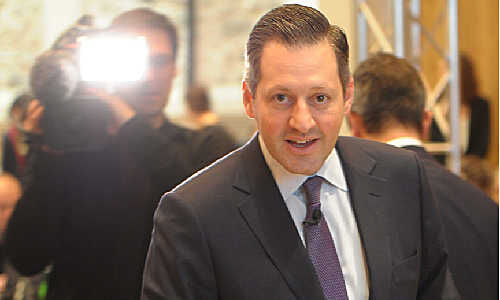Private Banker Boris Collardi: Double the Risk
Boris Collardi is increasingly a strain not just for Pictet but also for Julius Baer. The Genevan partnership is battening down the hatches while the Zurich private bank battles other legacy issues tied to the star Swiss banker.
Pictet's seven Geneva-based partners fear two things: that Swiss regulator Finma could commence enforcement proceedings after heavy sanctions in February for anti-money laundering lapses at Julius Baer. And that critical press reports on its youngest partner, ex Julius Baer boss Boris Collardi, attack the extremely discreet Genevan wealth manager's reputation.
Both are unknowns: a lawyer for Collardi, Peter Nobel, hasn't entirely managed to stanch speculation that Zurich prosecutors could investigate the banker. Julius Baer itself was smeared in two major money laundering scandals, PDVSA and FIFA.
Direct, Personal Responsibility?
There is no investigation, but preliminary inquiries that may lead to one are ongoing. Little is known of what Finma might have in store for Collardi, following an unusually assertive tone from CEO Mark Branson in February: the Bern-based regulator is looking at whether it can establish a «direct and causational responsibility» to individuals for the lapses.
That includes Collardi: he was CEO for the entirety of the period Finma investigated at Julius Baer (2009 to 2018) for serious breaches of crime prevention rules including nearly 70 business relationships in a three-year investigation showed irregularities.
Where Was Chairman Daniel Sauter?
Further Finma investigation would include others as well: for example, former Latin America boss Gustavo Raitzin; perhaps Rémy Bersier, who frequently courted clients from countries with widespread graft.
The role of long-standing risk and compliance boss Bernhard Hodler, who in 2017 took over as CEO from Collardi, needs illuminating. Former Chairman Daniel Sauter, who stood down last year, as bears responsibility as a constant member of Julius Baer's risk committee.
For now, public attention is riveted on Collardi and his nine-year reign at Julius Baer – a 45-year old feted Swiss banker whose legacy at the Zurich-based wealth manager is now being questioned.
Addressing Issues Late
To blame Collardi for all Julius Baer's lapses would be misguided: Finma pinpointed not individual cases at Julius Baer but «a poor compliance and risk culture in which legal obligations to combat money laundering were not given the required degree of importance» at every level, from board to back office.
It was also Collardi who acted on the problems, if very late: he backed Hodler's initiating Atlas, a costly, two-year clean-up that scoured all the bank's accounts and moved Raitzin out in favor of Beatriz Sanchez. And just before defecting for Pictet, he beefed up controls by poaching Oliver Bartholet from UBS as Julius Baer's new risk chief.
New Chapter Hobbled
Under new Chairman Romeo Lacher and CEO Philipp Rickenbacher, Julius Baer wants to embark on a new chapter, as finews.com reported. The past has become a huge strain on these efforts.
Julius Baer bankers recount a «Collardi culture» at the bank: business was practically solely oriented to maximizing growth and profits, and incentives were laid out accordingly.
Backlog Not Fully Cleared
The CEO himself had often cast the tie-breaking vote if private bankers and compliance officers disagreed on whether to take on dicier clients – and Collardi almost always decided in favor of accepting the client (Collardi has repeatedly denied this, saying that compliance had decided independently).
Julius Baer hasn't fully cleared the backlog from this era year and is likely to find further cases that illustrate systemic deficiencies in its anti-crime guidelines. Another prominent case from this period is playing out in a Geneva courtroom.
Client Checks Failed
Vladimir Antonov and Raimondas Baranauskas had allegedly plundered their own bank – Lithuanian Bank Snoras – and transferred hundreds of millions of euros to accounts at Julius Baer and other banks. The now-defunct bank's government-appointed liquidator wants 335 million euros, plus interest, from Julius Baer; the bank, it says, didn't do enough to prevent the embezzlement.
Julius Baer is defending itself against the claim, but with certainty didn't shine a very harsh light on the clients before accepting the money. A simple «know-your-customer» check would have revealed that the account owners had previously faced various criminal accusations.
This case too is not Collardi's alone to bear but falls squarely in his time at Julius Baer. The once-feted Swiss banker has become a risk factor – for Zurich as well as Geneva.



























